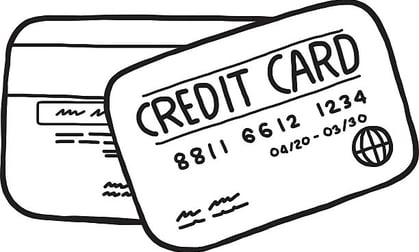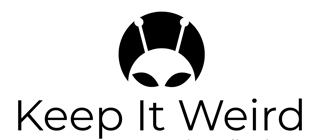Financials 101: Part 3 of 3
Banking & Credit! Wowee!
HUSTLINGTIPS & TRICKS


*part 3 was originally going to be about Health Insurance, but I've decided that topic isn't integral to understanding financials 101. Instead, we'll have a separate article about it down the road.
Having a bank account and a credit card is easy, right?
Well, it can be. But it can also be pretty complicated if you're just starting out with having & saving money. Part of this talk here will be based on personal experience and the other part will be resource sharing to sites that are great tools for getting started on this topic.
I signed up for a Checking & Savings account at age 17 and I got my first job at 18, so I'd deposit my checks and tip money at the bank, sometimes I'd save it. Actually, I spent my first paycheck on a tattoo so I definitely didn't know the importance of saving back then. When I was entering college, I got a credit card to pay for textbooks and class materials. Throughout college, I was pretty careless with my credit card. I overspent on supplies, coffee, and going out and didn't ever fully pay off my balance.
Here are two main things I learned from that time: interest and overdraft fees are brutal.
So, what changed? I just kept working jobs after I got out of college until I had more money to slowly make slightly larger payments on my credit card, but I was always juggling around 1-2K in debt thanks to an interest rate of 23% and general mismanagement of my money. I did at least manage to keep enough money in my checking and savings to avoid overdraft fees because I didn't want to stress check my banking app to see if I had $28 and whether or not my cup of coffee was going to also come with an overdraft fee of $15 leaving me with only $10 to get an additional fee the next day. It's a slippery slope when it comes to working with banks and credit card companies when you literally don't have money.
And it really wasn't until a few years ago did I learn you can transfer the balance of one credit card to another credit card with a sign-up bonus of 0% interest on balance transfers for 15-17 months. This enabled me to pay off my debt without constantly racking up interest fees.
Knowing this, and a few other things about credit, I have also learned how to manage a budget and plan out large costs (i.e. dentist procedures, vet appointments, car repair, buying a new computer).
Now, since I work as an artist/contract but also have a full-time job, I have two separate banks where I stash my direct deposit from my job and another for my side hustle money. If you just have a job working as an independent artist, you can probably safely start with one account, but if your business as an independent grows, it might be worth considering having a separate account just to keep better track of your income and expenses and then use your personal account for savings and storing money to pay off credit cards.
But let's jump into choosing a bank, types of bank accounts, and choosing a credit card.
Choosing a Bank
When you're picking a bank, there's obviously the larger banks out there like your Bank of Americas and Chase banks. You can also go the route of local credit unions, but that might limit you on online accessibility. And then, there's 100% online banks like Ally, although you don't have the option of cash deposits if you're working with cash.
In my mind, it makes sense to go with a bank you can easily access and has accounts that don't wreck you with fees or sign-up minimums. But look at what's most around you and see compare the offers that different banks have. If you want a bank you can reliably deposit cash into, it makes sense to choose a bank that has several of their ATMs in your area.
When in doubt, go inside of a bank, talk to a person working there. I've had surprisingly great encounters with folks who work at the bank and it's a lot less frustrating than talking into a phone robot asking to speak with a real human.
Bank Accounts
A checking account is a secure place to directly deposit money into (i.e. paychecks). And it's what your debit card and checks would pull from. Pretty straight forward. Think of this place as your immediate cash flow.
Savings accounts are ideal places for savings money for the future, hence the name. DIfferent banks have different deals with savings accounts (i.e. interest earned). Often time, banks have limits to the number of transfers on a savings account you can make. If you're making tax payments, as talked about in the previous blog post, you can easily set up a monthly direct deposit from your checking to your savings and treat that as a holding place for your quarterly tax payments.
*Not necessarily a separate account but sort of - credit cards. I use a credit card in place of a debit card for two reasons: 1. To build a good credit score & 2. Because it sucks more when your debit card information is stolen.
Choosing a Credit Card
There are...a fuck ton of credit cards & credit card offers out there. And they're kind of intimidating when you hear cautionary tales about credit card debt. However, credit cards are helpful tools in your magical world of personal finance and can actually work in your favor once you know how to use them to your advantage. Credit card companies offer all kinds of deals. You can hunt these deals down like a shark to maximize your earnings on sign-up bonuses and cash back, points, miles, etc.
You've got to find what's right for how you spend. If you're really trying to work as an indepenent artist, you can consider having a "business" card for your expenses. I can't pick a credit card for you, but credit karma is a great tool to shop out and compare different credit cards to best match your spending. Nerd wallet is another great resource for looking up credit card deals and more.
As just mentioned, credit cards are great for building up your credit score but that's only if you're paying off your statements. Reminders, reminders, reminders. Set up auto-pay, set up a monthly calendar reminder to check that your autopay went through & double-check your amount due.
Before you start applying for credit cards, definitely make sure you've done your homework and sign up for one to begin. If you get approved with a nice little line of credit (for your first card that amount could vary) you're probably set for the next several months. You want to avoid applying for multiple cards at the same time or in a close span of time because that involves these companies looking at your credit/credit score which can actually reduce your credit score. Of course, credit card companies want you to sign-up, so be wary of deals and be sure to read the details (even if the text is small and the language is dry).
Key takeaways:
Credit cards are not that scary. They require responsibility, research, and diligence to build up a good credit score
Banks are different on local and nationwide scales, find a bank that is ideal for your location
Have a savings account, just have one. It's a good place to store tax payments or other things you're saving up for you plan to spend on within a year or two
A checking account is a place for your immediate cash flow
That's a wrap on Financials 101 for independent artists! I hope this series got your gears turning on ways to start approaching your own financial management. Please remember, I am not a financial manager or an accountant and my advice should be taken with a grain of salt. Do your own research and talk to an expert before you try to tackle your taxes on your own.
